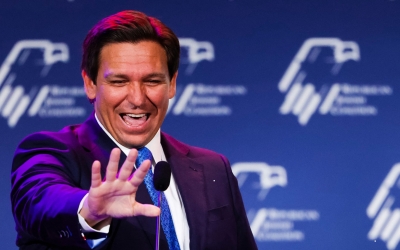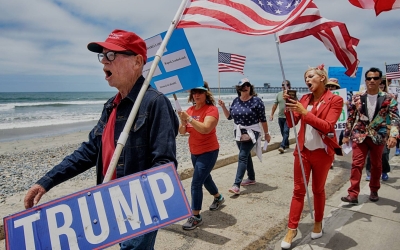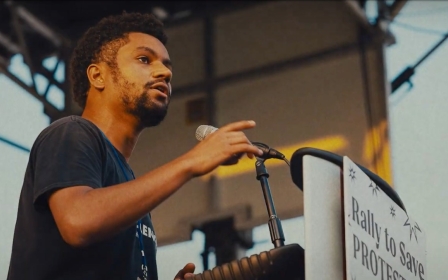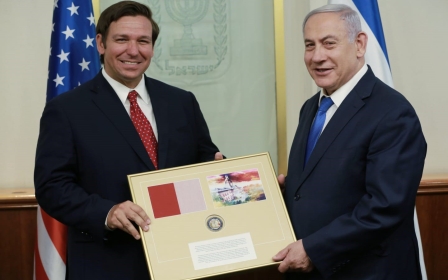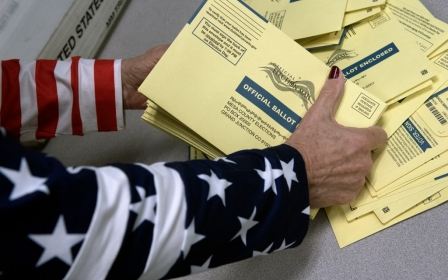Ron DeSantis: Republican rising star alarms Muslim, Palestinian communities
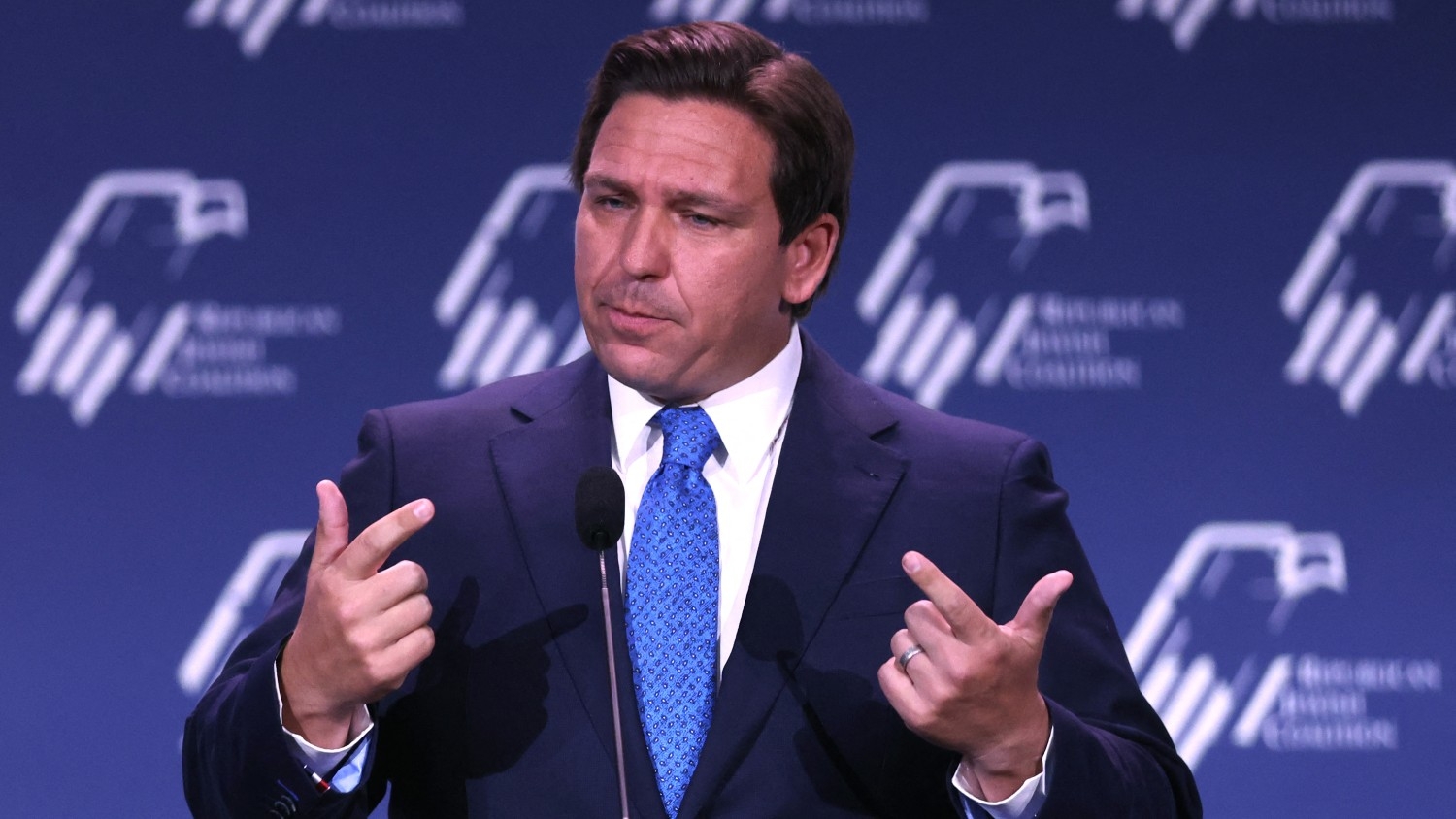
In 2006, then-Navy officer Ron DeSantis was an appointed attorney supporting the US military’s mission at Guantanamo Bay.
Not much is officially known about his months-long stint at the prison, which at its peak held nearly 800 Muslim men that were captured as part of the US-led war on terror.
But a recent interview from a former Guantanamo detainee helped shed some light on DeSantis' time there. Mansoor Adayfi said in a podcast with the Empire Files that while he was being force-fed at the prison, he saw DeSantis laughing.
'A presidential run of such a man as a GOP candidate would send a very negative message'
- Osama Abuirshaid, American Muslims for Palestine
"Ron DeSantis was there watching us," Adayfi said.
Middle East Eye reached out to another former detainee who said he could not remember whether or not he met DeSantis during his time there. A defence attorney told MEE that he had met DeSantis once while at Guantanamo, but said the meeting was "unremarkable".
New MEE newsletter: Jerusalem Dispatch
Sign up to get the latest insights and analysis on Israel-Palestine, alongside Turkey Unpacked and other MEE newsletters
MEE also reached out to DeSantis' press office for comment about his time at Guantanamo, but did not receive a response by the time of publication.
After serving in Iraq and then working at Guantanamo, DeSantis went on to pursue a political career that has in part been defined by leading legislation targeting Muslim and Palestinian communities.
And now, DeSantis' political stock has risen after he won a landslide reelection for governor this past November during the midterm elections, beating his opponent by nearly 20 points.
As the Florida governor floats a potential 2024 bid for president, which would mean a face-off against former President Donald Trump, Muslims and Palestinians are worried about what that would mean for their communities.
"A presidential run of such a man as a GOP candidate would send a very negative message, not only to American Muslims but to all minorities in this country," Osama Abuirshaid, executive director of American Muslims for Palestine, told MEE.
"The core of this message is that the Republican Party still represents an incubator of racism, intolerance, and Islamophobia, and that this party does not respect the values of equality for all citizens."
MEE reached out to the governor's press office for comment but did not receive a response by the time of publication.
Muslims in the crosshairs
DeSantis was elected to Congress in 2013, where he represented the 6th district of Florida. There, he co-sponsored a number of bills that targeted Muslim communities inside and outside the country.
On two occasions he co-sponsored unsuccessful legislation that sought to designate the Muslim Brotherhood as a terrorist group, a move that Muslim Americans see as an attempt to vilify the faith community, cripple civil society, and a designation that would feed into the Islamophobia industry.
"It is clear that the [Muslim] Brotherhood constitutes a real threat to the national security interests of the United States," he said during a House hearing in 2018.
The then-congressman was also the lead author of a bill introduced in 2015 that sought to ban the entry of immigrants from Iraq, Libya, Somalia, Syria, Yemen - all Muslim-majority countries.
The bill, titled the Terrorist Refugee Infiltration Prevention Act of 2015, never passed out of committee. However, several years later, former President Donald Trump introduced his own Muslim ban, which included all of the countries named in DeSantis' bill, but added two more in its first iteration: Iran and Sudan.
The governor also has links to a number of figures and groups that have a history of vilifying Muslims, including ACT for America, which has been designated an anti-Muslim hate group by the Southern Poverty Law Center.
Founded in 2007, ACT for America promotes itself as the “largest national security grassroots organization”. The group has built a reputation for lobbying state legislators to implement anti-Muslim legislation and has referred to Islam as “Islamofascism.”
According to a report by the Florida Center for Investigative Reporting, DeSantis gave an address to the group in October 2017. Naples Daily News, a local newspaper in Florida, also found that DeSantis accepted a paid trip to a conference hosted by the David Horowitz Freedom Center, which also featured a speaker who suggested the killing of Muslims.
"He's working with groups that are working against our community. So for example, this organisation called Act for America, they do a lot of work to undermine Muslim activism," Nadia B Ahmad, a law professor in Orlando, grassroots organiser, and a 2020 Democratic National Committee delegate for Florida, told MEE.
"Any activism by Muslims in the US, they really target that, including organisations like the Council for American-Islamic Relations and other groups."
And DeSantis is also opposed to the closure of Guantanamo, signing legislation that would prevent any US administration from doing so.
While leading a 2017 House committee hearing on "Combatting Homegrown Extremism", DeSantis said: "Radical Islamic extremism is the primary driver of this problem and deserves the government’s immediate attention."
He also said that the Obama-era Countering Violent Extremism (CVE) programme, which has been heavily criticised by civil liberties groups as unfairly targeting Muslim communities, was not going far enough and was "missing opportunities to identify and disrupt terrorist plots".
Targeting Muslim charities
DeSantis also spent his time in Congress targeting Muslim charities in the US.
In 2017, he drafted an amendment to a spending bill that would cut funding to Islamic Relief Worldwide, a well-known charity that has partnerships with a number of US and international agencies including USAID, the UN Development Fund, and the World Food Progamme, among others.
In the 2018 hearing where DeSantis discussed the Muslim Brotherhood, the lawmaker also used his opening statement to raise concerns about "terrorist" funding through the use of charities in the US.
In response to that statement, the Charities and Security Network sent a letter to DeSantis issuing concerns that his "hearing gave the impression that Muslim NPOs are to be targeted based on their ethnic and/or religious associations, rather than on conduct that threatens national security".
"I don't think it's so much directed at DeSantis the person as much as it is, for us, the themes themselves that are troublesome," Paul Carrol, the current director of the Charity and Security Network, told MEE.
"The problems of perspective, of misinformation, of treatment of charities and individuals simply because of their faith or their affiliation is what we are here to fight against."
Carrol said that DeSantis' targeting of Muslim charities builds on the work done by other NGOs that are "staunch supporters of the Israeli government".
"What is clear is that there were legitimate civil society actors in Palestine and Israel that worked on themes that are targeted by organisations aligned with Israel's government," he said.
"In the case of Islamic Relief worldwide, it really was I guess I would call it a smear campaign, sort of guilt by association."
During his opening testimony at the hearing, DeSantis also named the Holy Land Foundation as an example of a charity in the US "financing Hamas", a US-designated terror group.
Five men were arrested in 2004 on accusations that the Holy Land Foundation was both a terrorist organisation and was funnelling funds to the Palestinian political movement Hamas.
Civil liberties groups have argued the case was part of a disproportionate targeting of Muslim charities, given that the charges were related to aid given to impoverished Palestinians via "Zakat committees".
The American Civil Liberties Union has said that the Holy Land Foundation case was part of a pattern of the US government targeting faith-based charities "on the basis of unsubstantiated evidence and without even basic due process protections".
"American Muslims were wounded like all Americans by the September 11 terrorist attacks, but they were also dealt a second blow and suffered tremendously in the aftermath of the attacks, when their constitutional rights were infringed upon, and when they were subjected to surveillance, intimidation, and arbitrary arrests, and when they had their institutions targeted," Abuirshaid said.
"The likes of DeSantis summon all that ugly memory and bring it back to life."
A pro-settler politician
DeSantis made headlines last month after claiming that the occupied West Bank is not actually occupied by Israel, but is disputed territory. He also boasted that he was "the first statewide elected official to do public events in Judea and Samaria", referring to the West Bank by its Hebrew biblical name.
The comments are a culmination of his previous policy positions in regard to the Israeli occupation of Palestinian territories.
On a trip to Israel that DeSantis made in 2019, he blamed Palestinians for the occupation of their land.
"If you look at this whole conflict, to me, the biggest problem has been that Palestinian Arabs have not recognised Israel's right to exist as a Jewish state," DeSantis said in Tel Aviv.
"That kind of denialism poisons really everything," he continued.
Rather than positioning himself as simply a pro-Israel politician, he came into his political career quickly positing himself as a pro-settler politician as well - a position favouring policies that are in violation of international law.
Weeks after becoming governor of Florida, he blacklisted AirBnb after it made the decision to ban homes in Israeli settlements from being listed for rent on its platform - AirBnb later rescinded its decision and was taken off the blacklist.
He has also been a proponent of legislation against the Palestinian-led Boycott, Divestment and Sanctions movement, which "aims to end international support for Israeli violations of international law by forcing companies, institutions and governments to change their policies". More than three dozen states have adopted anti-BDS legislation in some form or another.
Florida adopted its anti-BDS law in 2016, prior to DeSantis becoming governor. But the then-congressman had still commended its passage and said he was leading "efforts in Congress to combat BDS".
Last month, during the Republican Jewish Coalition's annual conference, an unofficial start to the presidential primary season, DeSantis received an enthusiastic response from the crowd during his address.
And if Trump, who has led the Republican Party for the last six years, ends up facing off against DeSantis in the primary, Muslim activists and experts on Islamophobia say it will only exacerbate the Islamophobia that has been taking place for the past two decades of American politics.
"Rhetoric has played a critical role in justifying the targeting of Muslims in the War on Terror and beyond and both Trump and Desantis have weaponised narratives to further demonise and criminalise Muslims," Maha Hilal, a researcher and writer on institutionalised Islamophobia, told Middle East Eye.
"Exacerbating already mainstreamed and normalised Islamophobia, an increase in Islamophobic narratives emerging from a Trump/DeSantis faceoff will only serve to garner further support for policies that scapegoat Muslims and other marginalised [groups], under the guise of national security," said Hilal, who is also author of the book: Innocent Until Proven Muslim: Islamophobia, the War on Terror, and the Muslim Experience Since 9/11.
Hilal said that in a battle between Trump and DeSantis, "Muslims and other marginalised communities will be put directly in harm's way."
Middle East Eye delivers independent and unrivalled coverage and analysis of the Middle East, North Africa and beyond. To learn more about republishing this content and the associated fees, please fill out this form. More about MEE can be found here.


